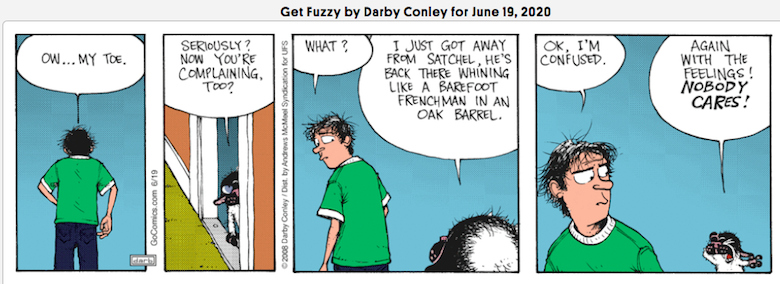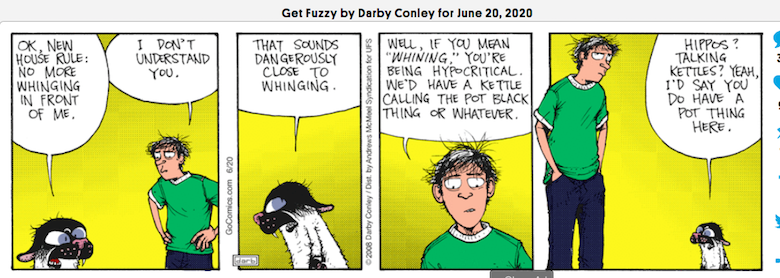Take a look at these two cartoon strips.
Notice that though these two strips were drawn by the same artist in the same week, we see both words ‘whine’ and ‘whinge’ being used synonymously, by the same character Bucky the cat.
Growing up in Sri Lanka, I had never heard the word whinge nor did I hear it even after I came to the US. None of the books I read in the English language ever used the word. My first encounter with it was in the 1990s on a visit to New Zealand where I found that the people there used it almost exclusively instead of the word whine. This was the case even among my relatives and friends who had used whine when growing up in Sri Lanka but had switched to whinge after moving to NZ. It was only later that I occasionally heard it being used in the US as well.
I became curious as to why there were two words with identical meanings that differed by just a single letter that changed the pronunciation considerably, with whine rhyming with wine while whinge rhymes with hinge. As with all such word usage issues, the explanation is not that simple and there is an interesting history. It is not that there was one word that happened to develop a minor variation in a different part of the world.
Whinge isn’t just a spelling variant of “whine.” “Whinge” and “whine” are actually entirely different words with separate histories. “Whine” traces to an Old English verb, “hwinan,” which means “to make a humming or whirring sound.” When “hwinan” became “whinen” in Middle English, it meant “to wail distressfully”; “whine” didn’t acquire its “complain” sense until the 16th century. “Whinge,” on the other hand, comes from a different Old English verb, “hwinsian,” which means “to wail or moan discontentedly.” “Whinge” retains that original sense today, though nowadays it puts less emphasis on the sound of the complaining and more on the discontentment behind the complaint.
That whinge is not standard yet in the US can be seen by the fact that Word software underlines it in red to suggest that it is a typo. And yet, the Get Fuzzy cartoons use both.
I am curious as to which word readers of this blog use, since they live all over the world.



Western Canadian, here.
I never heard whinge until a trip to Australia in 1986. I liked it so much, I switched.
Whine and Whinge have slightly different meanings for me.
Whinge is when someone is ineffectually complaining about something, especially about being asked or expected to do something.
Whine is when someone is using a high-pitched voice to try to persuade someone else to change their mind about something, to to complain about an outcome.
There is, of course, considerable overlap, although only whine implies something high pitched or annoying about the voice.
All just IMO, of course!
Oh -- I forgot to say. I’m in England.
As an Englishman I’ve known and used both all my life. They are subtly different. “Whine” primarily means the noise (“the whine of jet engines greeted him as he stepped onto the runway), though it can encompass the sense of expressing silly grievances that would usually be done using that noise. “Whinge” is solely about the expression of silly grievances and doesn’t usually connote a noise.
My parents complained about both whinging and whining in Manchester (UK) in the 1960s. Whinging was persistent complaining while whining was louder and higher pitched.
I, an American, am surprised to learn that whinge is not a perfectly ordinary and widely known American English word. And also that some people spell the present participle “whinging” rather than the (in my opinion) more legible “whingeing.”
However I would not rely on what Microsoft Word considers to be a word to mean anything substantial. The Microsoft dictionary writers have omitted all sorts of reasonable and ordinary American English words, including about half the ones I used in my dissertation.
Western Canadian.
Whine has more to do with pleading by smaller beings like dogs and children -- with some possibility of success.
Whinging has to do with just someone complaining while not expecting success but enjoying the act of complaining.
I am in the US. I Grew up on east coast, Massachusetts and Pennsylvania and now live in NW Wisconsin. I have no memory of ever having heard the word whinge until this post. I am posting this to Facebook to see if any of my family has heard of it. My grandmother came from Canada, PEI, so will be interesting of any of that family is familiar with it. My father’s family is from Puerto Rico, so quite certain it is a new word to them too.
US expat in Canada:
I hadn’t heard “whinge” until reading the Harry Potter books in the 1990s. I used it only with other Harry Potter readers until moving to British Columbia where there are a huge number of immigrants, at least in the Lower Mainland area in/near Vancouver and on certain parts of Vancouver Island, mostly around Nanaimo & Victoria. Quite a lot of the UK immigrants will use “whinge” and it gradually became more common for me to say, although it still feels a wee bit artificial to me when I speak it. I find I can write the word without feeling phony but feel a bit phony when saying it out loud without some other context -- someone else using the word first in the same conversation, that sort of thing.
In any case, I’ll agree with some others that “whinge” carries less information about the tone or voice of the complainant and more criticism of complaining for complaining’s sake. The first is about how you do it (“I can’t stand that whining voice”) and the second is about the why of it (“are you actually going to try to change things or are you just going to whinge?”). It took me quite a while to suss that out, though, and had to get some help from my out-laws in understanding how they were using it.
Growing up in Northern England in the 60s; didn’t know ‘whinge’. ‘whine’ was primarily used to describe a high-pitched continuous sound, and the word for what the cartoon characters mean was ‘moan’.
I think my first exposure to “whinge” was in the (apparently common) Aussie combination “whingeing Pom”, where “Pom” means English person. Possibly from English players habitually complaining to the umpire during Test Matches?
Whinge is the more common of the two here in Australia, and are used with identical meaning in my experience, except that whine can also be used to indicate a high pitched noise, while whinge can’t.
Dutch -- I only know the word whine (and I don’t get the cartoons, but I hardly ever find them funny anyway).
Dutch has several synonyms: zeuren, piepen, mekkeren, dreinen, emmeren, jeremiëren (after the biblical prophet), klagen, mauwen, meieren, zeveren, simmen and more.
Grew up in British Columbia, specifically in Victoria which tends to be more English than the English in some ways… still never really heard ‘whinge’ until reading the Hitchhiker’s Guide to the Galaxy where Arthur was described as ‘whinging around the galaxy in search of tea’. In my experience it was mostly a British-ism, though I’m not surprised it still exists in Australia and New Zealand as well, as Canada is sadly far more infected by American-isms than most of the rest of the Commonwealth.
I grew up on the west coast and live in western Oregon (Crip Dyke has been visiting my city!). I never hear whinge used here in conversation, and I only use it online. In my family, an annoying sound might be described as a high-pitched whine, but “whining” is the act of overly dramatic complaining.
I didn’t know the word “whinge” until I read this blog post just now. I have known “whine” for years.
I’m from Latvia. As a teen, I learned a mix between American and British English. I routinely used both American and British words and spelling in a single sentence together with Latvian punctuation rules. In my early twenties, I finally bit the bullet and got some books on English punctuation and spelling and tried to learn to stick with only one system. I still use words from various versions of English together, because in my brain all this knowledge is classified together under “English” and I still struggle to differentiate between various versions of it.
Ontario. First heard the word in Saudi Arabia in the 1980s—I was working with a lot of Brits and Irish. I seldom (never?) hear it here even from the expats.
Expatriate Kiwi here, now (ahem) naturalised Aussie. Yes Mano whinge is widely used in NZ, along with whine. However the meanings are subtly different. To accuse someone of “whining on” is to complain about their boring, monotone vocal mannerisms, whether they are complaining or not. And not just people: for example, car gearboxes with straight-cut spur gears make a whining sound unlike those with helical gear teeth. To whinge is to make an annoying, ongoing complaint -- very likely in a whining voice.
Back in college we had a Brit living in our dorms and he used whinge for bellyaching and whining. He would comment on auto racing on TV by commenting how he loved the whine of the tires. I was one of the few who knew the word whinge. I was able to define it from context watching rebroadcasts of “Are You Being Served” on the local PBS station.
From context I assumed it was a word popular with a previous generation of Brits.
I grew up in London and have heard/used both for as long as I can remember, though I agree with others above about the subtle difference in the meanings. I didn’t actually realise ‘whinge’ was a word Americans didn’t use until I read a book by an American a few years ago commenting that it was a great British word (I can’t remember what the heck the book was; ring any bells for anyone?)
I know Terry Pratchett used the word ‘whinge’ in ‘Eric’, for what that’s worth; it’s the reference that comes to my mind when I think about the word.
I had no idea they had different etymological origins until your post, so thanks for the info. But as to why they’re pronounced differently, surely it’s normal for a ‘magic e’ rule not to apply when there’s a ‘ng’ between the other vowel and the final ‘e’?
I grew up in Oxford and am with Dr Sarah in that I have heard/used both for as long as I can remember. I also agree with her and the others on the difference between the two words. I was on Zoom this evening with some friends and a work colleague of three of them was described as a whinging about something, then eventually as a “total whinger” (with the implied subtext that he was also a “total wanker”), as he always found something to complain about wherever he was, whatever he was doing.